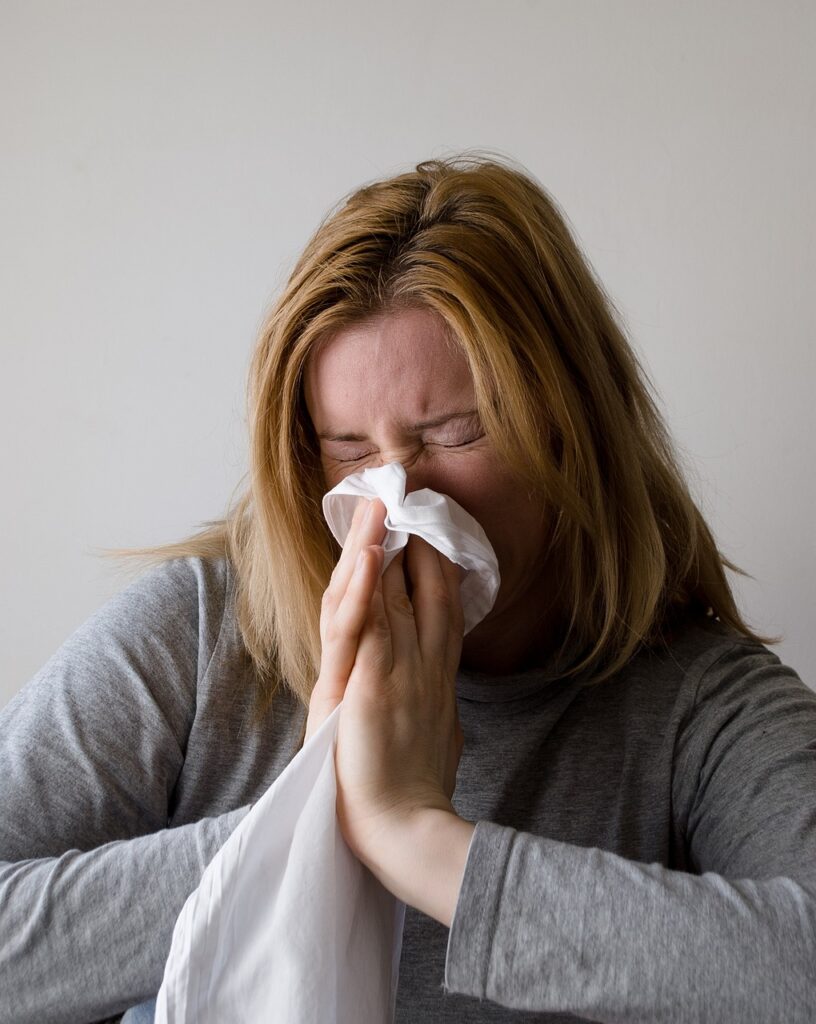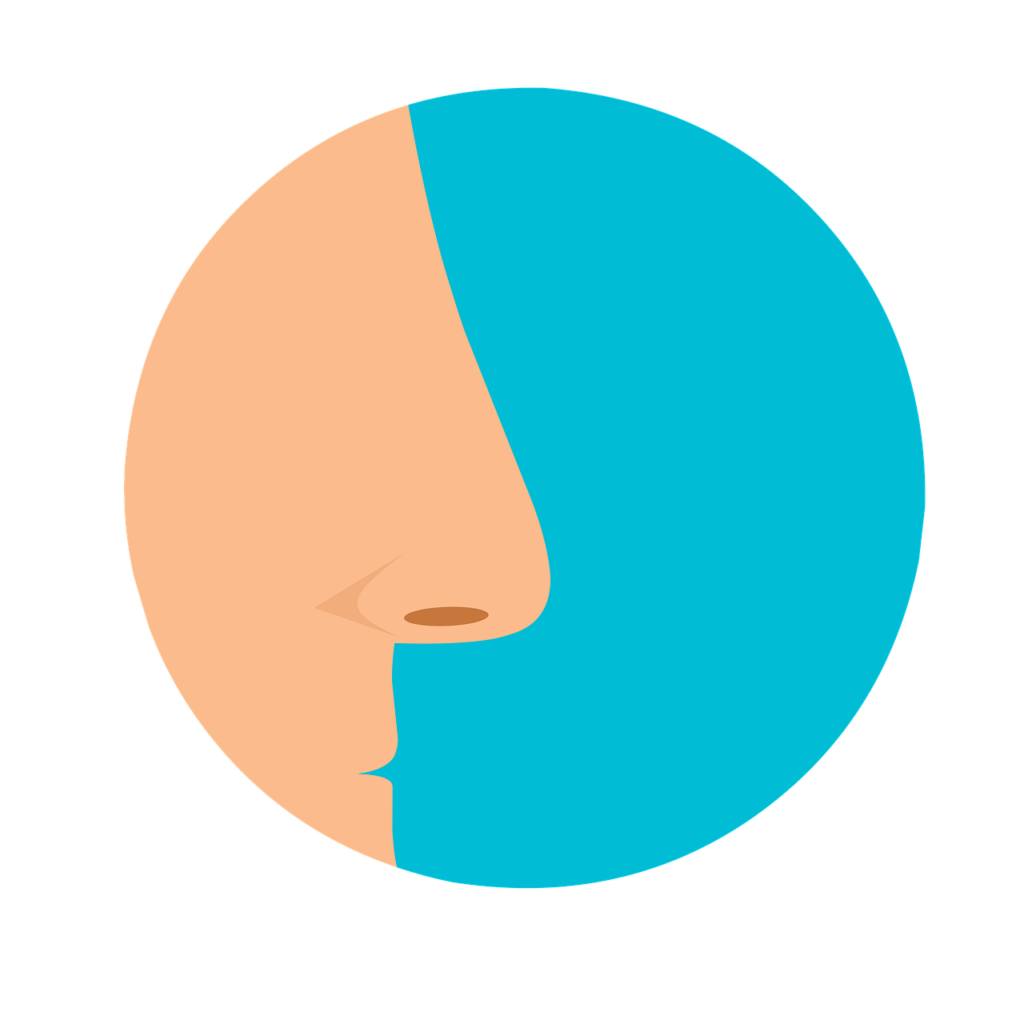Despite their unassuming appearance, nasal polyps can impose significant discomfort and disrupt daily life. This introductory guide endeavors to thoroughly investigate various facets of nasal polyps, encompassing their definition, pathology, causes, risk factors, signs and symptoms, investigations, differential diagnosis, and dietary considerations. Additionally, we will delve into the potential advantages of homeopathy in managing nasal polyps.

How Can We Define Nasal Polyps?
Nasal polyps are benign, soft growths that develop painlessly in the lining of the nasal passages or sinuses. Typically, teardrop-shaped and varying in size, these growths can impact one or both nostrils, giving rise to symptoms such as congestion, loss of smell, and even snoring. While nasal polyps may manifest in individuals of all ages, they are more prevalent in adults.
The Pathology Of Nasal Polyps
A profound understanding of the underlying pathology is imperative for grasping the nature of nasal polyps. These growths often emerge from chronic inflammation triggered by factors like allergies, infections, or asthma. Chronic inflammation induces swelling in the nasal lining, culminating in the formation of small sac-like growths or polyps. These, in turn, can obstruct the nasal passages, creating challenges in breathing.
What Are The Causes Of Nasal Polyps?
- Nasal polyps lack a singular cause.
- Frequently associated with underlying conditions.
- Common associations include chronic inflammation, allergies (like hay fever), asthma, and genetic factors.
- Chronic inflammation in nasal passages significantly contributes to their development.
- Allergens and genetic predispositions play a role in their occurrence.
What Are The Risk Factors For Nasal Polyps?
- Precise cause is not always clear.
- Certain risk factors increase susceptibility.
- More prevalent in adults over the age of 40.
- History of asthma or allergies is a significant risk factor.
- Repeated sinus infections contribute to the risk.
- Presence of cystic fibrosis elevates the risk due to its impact on mucus production.
The Types Of Nasal Polyps
Nasal polyps are typically classified into two main types:
- Ethmoidal Polyps: These are the most common type of nasal polyps. Ethmoidal polyps originate from the ethmoid sinuses, which are located between the eyes. They often grow in clusters and can extend into the nasal cavity.
- Antrochoanal Polyps: Antrochoanal polyps are less common and tend to be single, unilateral growths. They originate in the maxillary sinuses, located behind the cheekbones, and grow toward the back of the nasal cavity.
It is important to note that the type of nasal polyps a person has may influence their symptoms and treatment options.
The Stages Of Nasal Polyps
Nasal polyps progress through distinct stages, each characterized by specific features that influence their management. These stages are commonly classified as follows:
Stage 1 – Incipient Stage:
– Polyps are small and confined to the ethmoid sinuses.
– Mild symptoms, such as congestion and reduced sense of smell, may be present.
– Polyps may not be easily visible during routine examinations.
Stage 2 – Progressive Stage:
– Polyps grow larger and extend into the nasal cavity.
– Symptoms intensify, including persistent congestion, frequent sinus infections, and a notable reduction in the sense of smell.
– Polyps may become visible during nasal examinations.
Stage 3 – Complicated Stage:
– Polyps extend into paranasal sinuses, leading to more severe symptoms.
– Increased nasal congestion, facial pressure or pain, headaches, and significant loss of smell may occur.
– Complications like sinusitis and asthma exacerbations may manifest.
Stage 4 – Advanced Stage:
– Nasal polyps extensively invade nasal passages and sinuses.
– Symptoms are severe, causing persistent nasal congestion, significant loss of smell or anosmia, frequent sinus infections, and potentially obstructive sleep apnea due to severe airway blockage.
– Patients may experience a reduced quality of life.
Diagnosing And Staging Nasal Polyps
Diagnosing and staging nasal polyps typically involve a combination of clinical evaluation and diagnostic tests:
1. Clinical Examination:
– Thorough examination of nasal passages and sinuses using a lighted instrument.
– Allows visual assessment of size, number, and location of polyps.
2. Nasal Endoscopy:
– Involves using a thin, flexible tube with a camera for closer visualization of nasal and sinus passages.
– Aids in assessing the extent of the polyps.
3. Imaging Studies:
– CT (Computed Tomography) or MRI (Magnetic Resonance Imaging) scans provide detailed images.
– Helpful for assessing severity and extent of polyps, particularly for staging.
4. Symptom Evaluation:
– Severity of symptoms, such as congestion, loss of smell, and conditions like sinusitis, influences staging.
5. Lung Function Testing:
– In severe cases, lung function tests like spirometry may be performed to assess respiratory impact and complications like asthma.
Managing Nasal Polyps At Different Stages
The approach to managing nasal polyps varies based on type and stage. Here are general guidelines for treatment at different stages:
1. Stage 1 and 2:
– Manageable with medications, including corticosteroid nasal sprays to reduce inflammation and relieve symptoms.
– Avoidance of allergens and irritants can be beneficial.
2. Stage 3:
– Treatment may involve a combination of medications, such as oral corticosteroids and antibiotics for sinus infections.
– Lifestyle modifications may be recommended.
– Surgical intervention, like functional endoscopic sinus surgery (FESS), may be considered to remove polyps and improve sinus drainage.
3. Stage 4:
– Advanced-stage nasal polyps often require surgical intervention to provide relief.
– FESS, along with post-operative medications and ongoing medical management, is commonly employed.
– Continuous follow-up and treatment for any underlying conditions, like asthma, are essential.
Preventing Recurrence Of Nasal Polyps
Nasal polyps tend to recur, especially in more advanced cases. To reduce the risk of recurrence, patients are advised to:
– Adhere to prescribed medications and treatment plans.
– Manage underlying conditions, such as allergies and asthma.
– Identify and avoid triggers or irritants that may exacerbate symptoms.
– Regularly follow up with healthcare professionals for monitoring and adjustments to treatment.
Various Signs and Symptoms Of Nasal Polyps
Recognizing the signs and symptoms of nasal polyps is crucial for early detection and treatment. Common symptoms include:
1. Nasal Congestion: Persistent stuffiness or difficulty breathing through your nose.
2. Diminished Sense of Smell: A reduced ability to detect odors.
3. Runny Nose: Excessive nasal discharge, which may be clear or colored.
4. Postnasal Drip: A sensation of mucus dripping down the back of your throat.
5. Facial Pain or Headaches: Discomfort in the face or recurring headaches.
6. Snoring: Due to nasal congestion, snoring may become more pronounced.
7. Itchy Eyes: Allergic reactions and irritation of the eyes may occur.
Investigations For Nasal Polyps
If you suspect you have nasal polyps, it is essential to consult a healthcare professional for a thorough examination. To diagnose nasal polyps, your doctor may use a combination of the following investigations:
1. Physical Examination: Your doctor will inspect your nasal passages and may use a lighted instrument to examine the inside of your nose.
2. Nasal Endoscopy: This involves using a thin, flexible tube with a camera to get a closer look at your nasal passages.
3. Imaging Tests: CT scans or MRI scans may be recommended to provide detailed images of your sinuses and nasal passages.
Differential Diagnosis For Nasal Polyps
Several conditions share symptoms with nasal polyps, making a differential diagnosis crucial for accurate treatment. Conditions that may be confused with nasal polyps include:
1. Nasal Septum Deviation: A crooked or deviated septum can lead to similar symptoms, such as nasal congestion.
2. Sinus Infections: Chronic sinusitis can mimic the symptoms of nasal polyps.
3. Tumors: In rare cases, tumors in the nasal passages can cause congestion and loss of smell.
4. Rhinitis: Allergic or non-allergic rhinitis can lead to nasal symptoms, but the underlying causes differ from nasal polyps.
Foods To Avoid If You Have Nasal Polyps
While diet may not directly cause or treat nasal polyps, certain dietary choices can help manage symptoms and reduce inflammation. Here are some dietary considerations:
1. Anti-Inflammatory Foods: Incorporate foods rich in antioxidants, such as berries, leafy greens, and fatty fish, to help reduce inflammation.
2. Hydration: Staying well-hydrated can help keep mucus thin and alleviate congestion.
3. Spicy Foods: Some people find relief from congestion by consuming spicy foods that can help clear nasal passages.
4. Limit Dairy: For individuals with allergies or sensitivities, dairy products may exacerbate mucus production.
5. Avoid Allergenic Foods: If you have identified specific food allergies that trigger your symptoms, it is essential to avoid those foods.
Homeopathic Medicines For Nasal Polyps
1. Lemna Minor: Suitable for nasal polyps and swollen turbinates, especially in damp, rainy weather; take 3-5 pills, 3 times a day.
2. Formicum Acidum: Has a notable influence in preventing polyp formation, especially in cold and damp conditions; the recommended dosage is 3-5 pills, 3 times a day.
3. Teucrium Marum: Ideal for mucous polyps and chronic catarrh; take 3-5 pills, 3 times a day.
4. Sanguinaria: Effective for right-sided nasal polyps, chronic rhinitis, and dry and congested membranes; take 10 drops in half a glass of water, 3 times a day.
5. Calcarea Carbonica: Beneficial for polypi, nasal blockage with fetid, yellow discharge; recommended dosage is 2 tablets, 3 times a day.

Taking A Look Back
Nasal polyps, though potentially causing discomfort and inconvenience, can be effectively managed with the right information and a comprehensive treatment approach. Whether opting for conventional medicine or exploring homeopathy as a complementary therapy, it is crucial to consult with a healthcare professional.
Understanding the pathology, causes, risk factors, signs, and symptoms, and undergoing appropriate investigations are pivotal steps in achieving effective management. Additionally, considering dietary factors and avoiding allergenic foods can contribute significantly to overall well-being.
Homeopathy, with its holistic and individualized approach, presents potential benefits in addressing the root causes of nasal polyps. While not a one-size-fits-all solution, it can be a valuable option for individuals seeking natural and minimal side-effects causing treatments.
It is important to note that the journey to managing nasal polyps is unique for everyone. Collaborating with healthcare professionals and exploring diverse treatment options allows for finding the most effective and comfortable path to relief and an improved quality of life.
Reach out to us for a Consultation
For any queries, reach out to us at contact@homeopathic.ai
This blog is for information purposes. It’s crucial to note that while homeopathy is a centuries-old practice with many adherents worldwide, always consult a qualified homeopath or medical professional before initiating any treatment.





